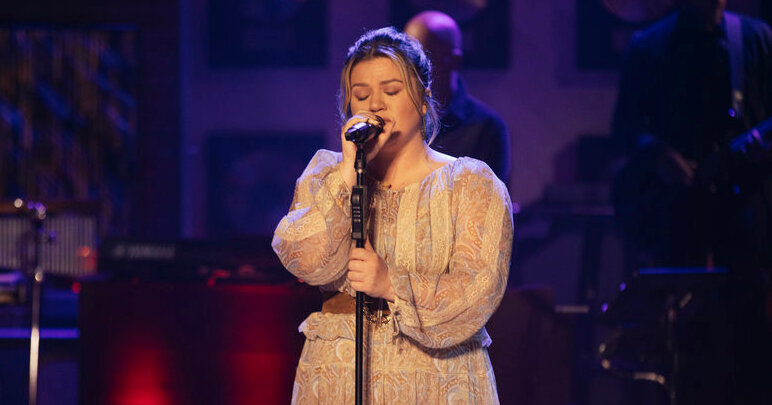
On the afternoon of April 26, 2022, daytime television viewers were greeted with a rare treat: an internationally famous talk-show host, wearing polka-dots and bathed in moody lighting, singing a haunting, bluesy dirge that, at its finale, found her belting out near the top of her impressive vocal register, “We hope that you choke, that you choke.”
Yes, it was Kelly Clarkson covering Radiohead’s “Exit Music (for a Film),” as a part of the beloved “Kellyoke” segment that opens each episode of “The Kelly Clarkson Show,” her Daytime Emmy-winning syndicated series. Over the program’s three seasons, Clarkson has now covered more than 500 songs; her best and most surprising choices have a tendency to go viral.
Her take on “Exit Music” was certainly one of those, and the cultural cognitive dissonance of hearing the heir to Ellen DeGeneres performing an album track from the 1997 art-rock classic “OK Computer” was enough to generate headlines. (“Watch Kelly Clarkson Sing the Hell Out of Radiohead’s ‘Exit Music (For a Film),’” announced the music website Stereogum.) Like most great covers, Clarkson’s rendition put a fresh spin on the original that, in turn, allowed an old song to be heard anew. As the Stereogum music critic Tom Breihan wrote, “Yorke’s voice is such a part of Radiohead’s whole sound that I rarely consider it in isolation, but when Kelly Clarkson is hitting those same notes, it really throws the size of Yorke’s voice into relief.”
Such are the daily revelations of Kellyoke, which in an era of bottomless terrible news I find to be one of the last predictably good and interesting things on network TV. The key, perhaps, is that few of the songs Clarkson chooses to sing make sense within the traditional anodyne aesthetic of daytime TV; DeGeneres busting a move with her studio audience this is not.
Clarkson, by contrast, has recently tackled such sulky fare as the Smiths’ “How Soon Is Now?,” Pixies’ “Where Is My Mind?” and — perhaps an even stranger and more difficult-to-nail Radiohead song than “Exit Music” — “Karma Police.” (“Karma police, arrest this girl,” sang the original American Idol, “her Hitler hairdo is making me feel ill.”)
Kellyoke is a utopian place beyond the limiting logic of rockism and crotchety arguments that people stopped writing decent songs after [insert your arbitrary year here]. Kellyoke believes that “Jolene” can (and should!) coexist with “High Horse,” “Edge of Seventeen” with “Dancing on My Own.” In a time of algorithmically controlled taste, Clarkson’s choices have a refreshing eccentricity and enthusiasm, as though she is making an idiosyncratically personal but always musically reverent argument that each of these compositions belongs in the modern pop songbook.
The only downside of the Kellyoke segment is that it’s too short (around two minutes, tops) so most of Clarkson’s covers are tantalizing and sometimes rushed abridgments of material that requires more space to breathe. To address this problem, though, she is at last releasing a “Kellyoke” EP on Thursday, featuring full-length studio versions of six of her favorite covers.
The opener, a swooning take on “Blue Bayou,” ably makes the argument that Clarkson has long been her generation’s Linda Ronstadt — an expert interpreter of familiar material, and an effortlessly fluent liaison between the worlds of rock, pop and country. Better yet is the following track, a smoldering reading of the Weeknd’s 2018 hit “Call Out My Name” which adds some welcome muscle to the original’s wounded melancholy. The juxtaposition between these two songs lays out one of the main aims of the EP and the ethos of Kellyoke itself, which is to place today’s hits in an historical continuum and suggest that they are just as worthy of tribute as already canonized classics.
The EP’s centerpiece, and its most successful application of that argument, is Clarkson’s sublime cover of Billie Eilish’s 2021 song “Happier Than Ever.” An ennui-laden, Peggy Lee-style ballad that, halfway through, morphs into the best song My Chemical Romance never wrote, “Happier Than Ever” allows Clarkson to flex in two different genres. But, as strong as the original is, Clarkson teases something new and more mature out of the song, particularly during its explosive and expletive-filled climax.
What Eilish performs as a cathartic shedding of youthful heartbreak becomes, in 40-year-old Clarkson’s embodiment, an earth-quaking post-divorce anthem sung by a grown woman who’s had it up to here with childish behavior. “Don’t waste the time I don’t have,” Clarkson wails with a fiery force that could fuel a small country’s power grid, and the backing singers rise to meet her intensity. To paraphrase her muse Thom Yorke, this is what you get when you mess with her.
Speaking of which, the EP’s cut of Radiohead’s “Fake Plastic Trees” is, unfortunately, a disappointing finale: Clarkson sounds bored with the verse’s straightforward melody, adding unnecessary trills to keep herself engaged and failing to match the raw desperation of Yorke’s original vocal. (For a recording of Clarkson tackling Radiohead with much better results, see her transcendent cover of “Creep,” from the 2016 release “Kelly Clarkson Live.”) The decision to cover the indie-pop group Shaed’s chirpy 2018 song “Trampoline” is another misfire; Clarkson’s vocal is certainly impassioned and adds some emotional heft to the original, but she’s unable to make the case that the source material is worthy of inclusion — especially when there are more than 494 other Kellyoke numbers just waiting to get the full studio treatment.
Each member of the Kellyoke faithful will, of course, have quibbles over what didn’t make the cut — I’m partial to her piano ballad version of Kelsea Ballerini’s “Peter Pan,” and also harbor a stubborn dream that Clarkson will someday release a full-album cover of “OK Computer,” “Fitter Happier” and all — but this EP captures much of what makes the segment so enjoyable. For all its nods to pop present, “Kellyoke” is a spiritual throwback to the earliest days of Clarkson’s career. It’s reminiscent of the weekly, monocultural joy of tuning into the 2002 season of “American Idol,” waiting to see which song the young powerhouse from Texas would belt out this time, perhaps believing — a little too naïvely — that every voice the show discovered would be as enduring as hers.




